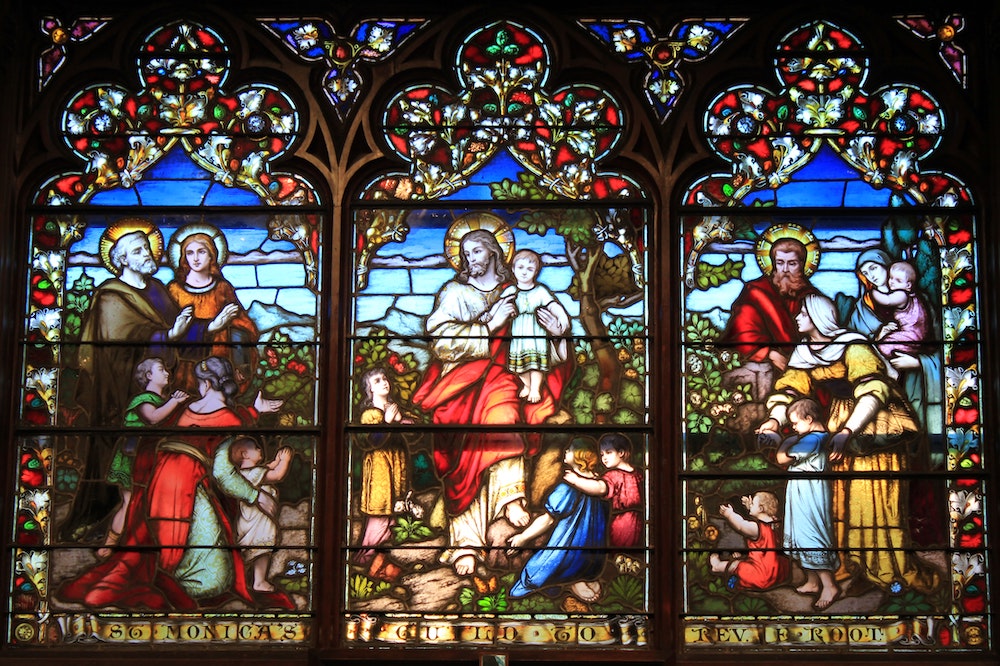
(Unsplash/Marek Kizer)
Early in my college career, a creative philosophy teacher introduced me to René Descartes. The young Jesuit described Descartes as a passionate seeker for certainty. Descartes decided to doubt everything until he came to some indisputable fact. Descartes climbed into a closet devoid of sensory distractions where he could doubt in peace. Crouched midst hanging cups, he finally hit upon his rock-solid truth: "Je pense, donc, je suis," or, "I think, therefore I am." I was pretty impressed. Descartes then went on to other proofs, the mathematical and theological. Based on that closet experience, he could believe in reason and therefore in God. It was brilliant!
Time passed, and I began to realize that Descartes missed the most basic truth of all. He ignored the fact that the grandmother who raised him had taught him how to say "I." She taught him the language he needed to formulate and communicate his thoughts. More importantly, it was only because his mamie held him and looked into his little face and called him "you," that baby René could comprehend that he was a person related to others in the world.
"You and I." Those are the rock-solid underpinnings of personal awareness and therefore of belief and knowledge. Descartes wouldn't have had the vocabulary to use in that closet if others had not taught him that he was an "I" related to others around him.
Sometimes our Christian theology has been presented like Descartes' logic. We have heard that there are facts that are true and unchanging, and that our understanding of God can be explained through these. That's given us superlative vocabulary describing God as all-powerful, all-knowing and eternal: simply put, the biggest and best. According to that philosophy, God has to be unchanging because best is best, perfect is perfect; to change would imply that either the previous or the latter state was less than the other.
Whew! There we have it, God is as understandable as a mathematical equation.
But that doesn't cut it. Those categories for describing God reflect philosophies that are no more insightful than was Descartes as he crouched midst the cups and convinced himself that his individuality was the most basic truth. Those categories ignore the reality that personhood isn't rooted in thinking, but relating. A logic-bound, philosophical description of God is absolutely foreign to the God we meet in the Hebrew and Christian Scriptures. The superlative quality of the God we encounter through Scripture is love. God the creator, the God of Moses and the prophets, is the God who initiates, seeks and sustains everlasting union with creation. Rather than describing God as the first cause, the mover of the big bang, we would do better to conceive of God as the first and supreme lover.
Advertisement
That brings us to the solemn feast we celebrate today. Theologians have turned themselves inside out trying to explain the Trinity. From the philosophical types who revel in mathematical precision to the mystics who lose themselves in God's being, we have a myriad of attempts to conceive of God. Unique among all world religions, Christians believe that God has revealed self to us as a Trinity: three persons who are who they are because of how they love one another and whom we know because God's nature is to reach out.
Today's selection from the Gospel of John describes the Father as the one who sent the Son to share eternal life with all who will believe in God's offer. Last week, we heard John tell us that the Spirit empowers us to forgive, thereby enabling us to participate in God's saving action. The God we contemplate today is present in, with and for us. That's it in a nutshell — theology and the whole history of salvation are simply the story of God's love: Jesus, the Word incarnate, draws us into his relationship with God as father and shares the divine Spirit who dwells in us.
Where does that leave us? It means that the privileged way to know God is through love — any and all real love. Church teaching tells us that married love is a sign-sacrament of God's love. The First Letter of John professes that every exercise of love is an experience of God.
The God we know through Christianity exists as a community of overflowing love. St. Augustine taught us that our hearts are restless until they rest in God: The love we have and the love we crave are God's lure, drawing us to know and be like God, loving from the inside out.
Down deep, even Descartes knew that. Like Thomas Aquinas before him, he wrote philosophy and then went to church to sing "Ubi Caritas," proclaiming that love alone teaches us who God is.
[St. Joseph Sr. Mary M. McGlone serves on the congregational leadership team of the Sisters of St. Joseph of Carondelet.]
